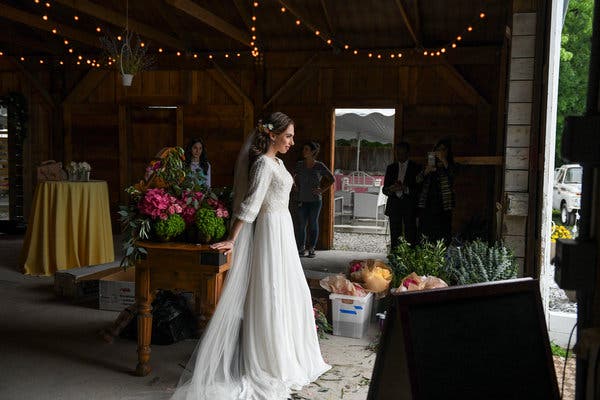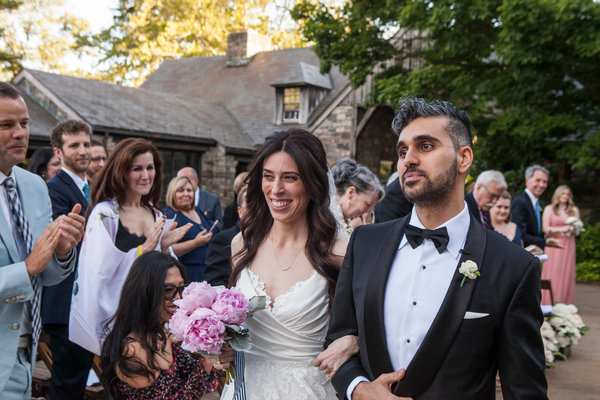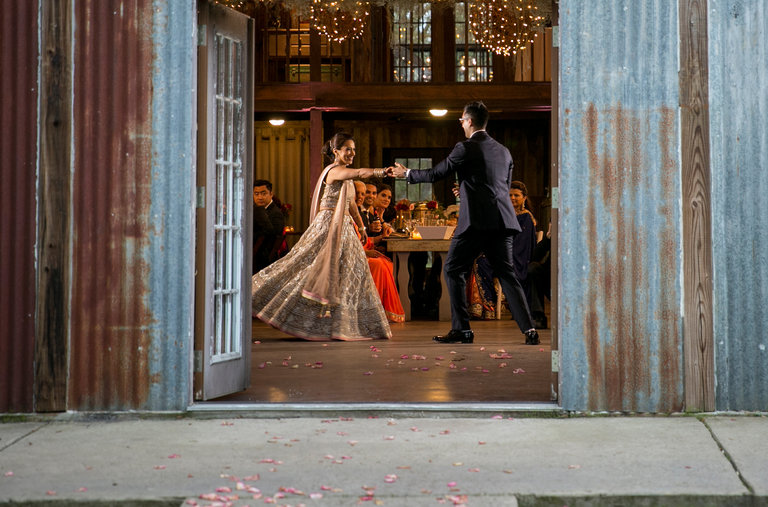When he feels the spirit, Isaiah Rothstein bursts into song. He felt it on his first date with Leah Gottfried in early 2018. They were in Bryant Park and bird droppings landed in his food, and so he then took her to the top of Rockefeller Center. Standing next to Ms. Gottfried there, he felt the need to do more than just comment on the view of Manhattan.
“I think in musical language sometimes,” he said. “If this moment were a song, what it would be? And then I’ll just play. People usually jive on it I think.”
She jived on it, though she does not quite remember the lyrics: “It was something about all the miles of the city that he saw,” she said. “Something about miles.”

CreditDesiree Rios for The New York Times
Mr. Rothstein, 30, and Ms. Gottfried, 28, are a modern Orthodox power couple. He is the rapping, singing frontman of Zayah and a rabbi for Hazon in New York, which calls itself the Jewish lab for sustainability. He was one of Jewish Week’s 36 under 36 for 2019, which applauded his ambition to “follow in the footsteps of the ‘Hamilton’ creator Lin-Manuel Miranda.” Mr. Rothstein is working on a musical about Queen Esther, the figure of legend who foiled a genocide of the Jewish people.
But Mr. Rothstein is a C-lister when compared with Ms. Gottfried, a child actor who had her first agent when she was 11 and is frequently featured in Jewish publications including Kveller.com and Jewess Magazine. Her web series “Soon By You,” reminds its viewers of an Orthodox take on “Friends.”
“Soon By You” makes liberal use of Ms. Gottfried’s own dating experiences. It features a lot of confused men.
“I’ve had guys be really puzzled about filmmaking in general and with a woman wanting to be a filmmaker and how does that work with a family?” said Ms. Gottfried, who runs her own production company. “Or they pitch me their own idea for movies. That has happened so many times. So many of my dates were like bad pitch meetings that I didn’t sign up for.”
Mr. Rothstein didn’t want to one-up Ms. Gottfried; he wanted to impress her. For their third date, he drove from Crown Heights, Brooklyn, to Passaic, N.J., where she was living at the time, in the middle of a snowstorm. Nothing was open, except for a Dunkin’ Donuts, so the two spent hours there, in song (the radio played the Dixie Chicks cover of “Landslide,” prompting a singalong) and in silence.
“There was a stillness,” Mr. Rothstein said, “which is funny for me because I talk a lot.”
He dropped her home at 1 a.m., and by the time he arrived in Brooklyn two hours later, he knew he was in trouble: He really cared about her.
Though Mr. Rothstein is (very) extroverted, he does not like feeling emotionally exposed. He grew up in Monsey, N.Y., feeling different from his peers, as a white-passing member of one of the few multiracial families in town. He was often asked if his mother, who is black, was his nanny, and was told he wasn’t a real Jew. School days would often end in fistfights.
Those experiences pushed Mr. Rothstein to grapple with his Jewish identity as he grew older. He ended up staffing seven separate birthright trips to Israel. By the last few, he had come to realize that he had a passion for “creating positive Jewish experiences for people.” He decided to become a rabbi.
Ms. Gottfried grew up blocks away from Mr. Rothstein in Monsey, but did not meet him until late 2017. She was raised ultra-Orthodox for the first five years of her life, until her parents divorced and her mother transitioned to modern Orthodox, which seeks a balance between Jewish tradition and the modern world.
Her mother, Esther Litchfield-Fink, and she, are “like, ‘Gilmore Girls’ level close,” Ms. Gottfried said, referring to the Amy Sherman Palladino show about a mother and daughter who are best friends. Ms. Gottfried and Ms. Litchfield-Fink love all of Ms. Palladino’s shows including “Bunheads” and, of course, “The Marvelous Mrs. Maisel.”
“For awhile she wanted me to be a lawyer I think because I was so argumentative as a kid,” Ms. Gottfried said. “But she also very much supported my career decisions. Sometimes she doesn’t like how I dress.” (Ms. Litchfield-Fink thinks her daughter’s outfits could stand to be a little more provocative.)
Others in Ms. Gottfried’s community growing up were put off by her chutzpah, and her interest in performing. It took her a long time, she said, to find Jews with whom she could feel completely comfortable being herself. One space that felt particularly right was Hevria, an online community of creative Jews. In November 2017, Ms. Gottfried and Mr. Rothstein attended one of the group’s open-mic nights in Crown Heights, where they met. A month later, Ms. Gottfried read a poem at a Hevria event and afterward, Mr. Rothstein messaged her on Facebook and asked for a copy.
They ran into each other again a few months later at a Jewish conference in Princeton, N.J., where they both gave presentations about their backgrounds; each attended the other’s. Toward the end of the weekend, he asked her out. They already knew so much about each other that small talk barely felt necessary.
By the time, Ms. Gottfried’s mother met Mr. Rothstein, at Leah’s 27th birthday party in April 2018, the relationship had accelerated. In August, the couple posted a music video they had made together (she directed, he starred) to YouTube.
Last Thanksgiving, he proposed. Via song, of course.
Ms. Litchfield-Fink knew Mr. Rothstein was the man for her daughter, she said, when Ms. Gottfried told her he was the right person.
“I trust her judgment 100 percent so I knew that no matter what I thought it was up to her and it had to come from her,” she said.
Their engagement lasted six and a half months. Their secular friends thought that was pretty short. Their Orthodox relatives questioned why it was taking so long.
But on June 16, a diverse group of Jews convened on Oz Farm in Saugerties, N.Y., where rain had turned the fields to mud, leading to a celebration that was as improvisational and joyous as one of Mr. Rothstein’s songs. The marriage was celebrated by a Judaism of dark robes and golden rompers, of flower crowns and shtreimels (fur hats), of side curls and hair dyed scarlet, and of unceasing music.
“This is like a hipster Jewish mecca,” said Chavie Lieber, a journalist for Business of Fashion and one of Mr. Rothstein’s oldest friends. As she explained what about the wedding was traditional and what was not, her husband, Yoni Stokar, walked over and was asked to guess how many rabbis he thought were in attendance.
“Thirty-five,” he said.
“Self-identified rabbis or actually ordained rabbis?” Ms. Lieber asked.
The formal proceedings began with Rabbi Dovid’l Weinberg conducting the bedeken ceremony, as Mr. Rothstein and his guests celebrated the wedding to come, slowly making their way over to where Ms. Gottfried sat with her own guests. The traditional veiling ceremony began, which most of the guests watched through their phones. The groom was flanked by Hasidim in formal wear. A friend of Mr. Rothstein’s, Zach Mayer, played a soprano saxophone as the men swayed and sang.
“I met my girlfriend after Isaiah and I started singing together,” Mr. Mayer said. “I feel like he just radiates love.”
There was a lull after the bedeken, as the band got in place and the more observant attendees paused to observe the afternoon prayer. Ms. Gottfried and her mother disappeared. Mr. Rothstein, clean-shaven and dressed all in white, was flanked by a bearlike South African Jew, Folli Tessler, who served as his shomer, or watchman. Mr. Rothstein excused himself to speak to his mother, Tanya Rothstein, who was dressed in gold.
“Traditionally there was a concept that on the day of a person’s wedding or two days before, they would have someone watch the groom because there was a tradition of persecution before wedding days and exciting things,” Mr. Tessler explained, visibly nervous to be separated from his charge.
The ceremony began, with the band (including Mr. Stokar) leading. Traditional Hebrew songs were paired with Disney melodies from “The Lion King” and “Mulan.” Mr. Rothstein, standing under the huppah, was handed a guitar. “New age,” one guest muttered. “Right, right,” her companion responded.
He started singing, and Ms. Gottfried walked in. She moved toward the huppah and the mothers led her in a circle around Mr. Rothstein. Prayers were offered. As is traditional, men read seven blessings; as is not, they were accompanied by women, who read seven intentions for the marriage.
Babies were introduced to one another. Multiple shofars, or ram’s horns, blew. Guests declined to remain in their seats, and crowded close to the huppah. After about 45 minutes, Ms. Gottfried, not Mr. Rothstein, punctuated the ceremony by smashing a glass. The bride and groom retreated into solitude with several witnesses. Everyone waited. “I’m starving,” Ms. Gottfried said. Finally, they emerged on horseback.
There was wild, gender-segregated dancing and the dinner, where Ms. Gottfried took the microphone.
“Isaiah’s always performing for me, singing and rapping,” she said. “I thought I would perform for you for once.” A drumbeat started, and Ms. Gottfried began to rap about a boy with a guitar who strummed and strummed his way into her heart.
ON THIS DAY
When June 16, 2019
Where Oz Farm, an events space, in Saugerties, N.Y.
Stormy Weather It rained incessantly the day of the wedding, which forced the proceedings inside. The bathrooms, in two trailers outside the barn, were filled with men changing mud-coated sneakers into dress shoes.
Divine Yenta Various people at the wedding, including Mr. Rothstein’s older brother J.R. Rothstein, claimed some responsibility for having introduced the two. The couple had thought this might happen. “People always say like, ‘How’d you meet, who you set up?’ and I very much feel like God orchestrated the entire thing,” the bride said. The groom agreed. “Whenever people try to take credit for setting us up,” he said shaking his head. “We set ourselves up and God set us up. You didn’t set us up. Thank you.”
Roving Shofar The ram’s horn, traditionally blown to celebrate the Jewish New Year, made several appearances during the wedding ceremony, traveling around the room. Its sound is similar to that of a swan whooping with a constricted windpipe.
Breaking the Glass The couple decided, as a gesture of inclusivity, to task Ms. Gottfried with stomping on the wineglass, traditionally a task for the groom. She looked apprehensive but determined, as she lifted her foot and brought it down hard. “I did it!” she shouted into her husband’s ear.
Continue following our fashion and lifestyle coverage on Facebook (Styles and Modern Love), Twitter (Styles, Fashion and Weddings) and Instagram.









